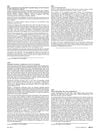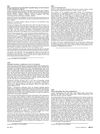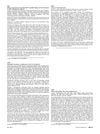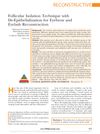
New acne treatments like clascoterone and minocycline foam are effective, and using antibiotics carefully is important to avoid resistance.
 1 citations,
May 2015 in “Journal of The American Academy of Dermatology”
1 citations,
May 2015 in “Journal of The American Academy of Dermatology” Oral clindamycin and rifampicin are the most effective treatments for Folliculitis decalvans.
 May 2015 in “Journal of The American Academy of Dermatology”
May 2015 in “Journal of The American Academy of Dermatology” Oral minoxidil improved male baldness, but had side effects; certain antibiotics effectively treated a rare scalp condition; hair transplants might trigger another scalp condition.
 134 citations,
January 2019 in “American journal of clinical dermatology”
134 citations,
January 2019 in “American journal of clinical dermatology” Antibiotics can reduce acne but may lead to resistant bacteria, and understanding the skin's bacteria is important for treatment.
 13 citations,
May 2015 in “Journal of The American Academy of Dermatology”
13 citations,
May 2015 in “Journal of The American Academy of Dermatology” Oral minoxidil improves hair growth in men with hair loss, but caution needed for those with heart issues.
 May 2015 in “Journal of The American Academy of Dermatology”
May 2015 in “Journal of The American Academy of Dermatology” Oral minoxidil effectively increases hair growth in male baldness but can cause side effects like excessive hair growth and swelling.
April 2024 in “Molecules/Molecules online/Molecules annual” Paris polyphylla saponins may effectively treat acne due to their antibacterial and anti-inflammatory properties.
 1 citations,
April 2018 in “Revista da Sociedade Portuguesa de Dermatologia e Venereologia”
1 citations,
April 2018 in “Revista da Sociedade Portuguesa de Dermatologia e Venereologia” Hidradenitis suppurativa is a chronic skin condition more common in women, linked to genetics and lifestyle factors, and associated with various other health issues.
 4 citations,
June 2002 in “Clinical and experimental dermatology”
4 citations,
June 2002 in “Clinical and experimental dermatology” Effective treatment for hidradenitis suppurativa varies, with antibiotics commonly used and surgery as an option, but no single method is universally successful.
 7 citations,
September 2013 in “Current Dermatology Reports”
7 citations,
September 2013 in “Current Dermatology Reports” Some skin medications are safe for pregnant women, but others pose risks or should not be used.
 September 2009 in “Pediatric Dermatology”
September 2009 in “Pediatric Dermatology” UVB is good for a skin condition in Asian kids, a lotion works for head lice, a drug helps with a skin blistering disorder, a foam reduces itchiness in skin inflammation, birthmarks can be more widespread, and criteria for a neurocutaneous disorder were agreed upon.
 January 2019 in “ARC journal of pharmaceutical sciences”
January 2019 in “ARC journal of pharmaceutical sciences” Acne can be managed with various treatments and requires psychological support due to its emotional impact.
 116 citations,
December 2017 in “International Journal of Women's Dermatology”
116 citations,
December 2017 in “International Journal of Women's Dermatology” Adult female acne treatment should be personalized, considering individual preferences and pregnancy, using various topical and oral medications while managing side effects and resistance.
 20 citations,
October 2018 in “American Journal of Clinical Dermatology”
20 citations,
October 2018 in “American Journal of Clinical Dermatology” Some drugs can cause skin and hair color changes, often reversible when the drug is stopped.
 11 citations,
February 2007 in “Journal of Child and Adolescent Psychiatric Nursing”
11 citations,
February 2007 in “Journal of Child and Adolescent Psychiatric Nursing” Combining mood stabilizers with antipsychotics is more effective for treating children with bipolar disorder than using mood stabilizers alone.
 2 citations,
October 2018 in “Springer eBooks”
2 citations,
October 2018 in “Springer eBooks” Cancer treatments can cause skin-related side effects that may affect patient quality of life and require changes in treatment.
 March 2017 in “InTech eBooks”
March 2017 in “InTech eBooks” Acne vulgaris is a common skin condition that can cause low self-esteem and depression, and early treatment is important to prevent scarring.
 January 2017 in “Springer eBooks”
January 2017 in “Springer eBooks” The document explains various skin conditions and their treatments.
 76 citations,
November 2009 in “Medical Clinics of North America”
76 citations,
November 2009 in “Medical Clinics of North America” Hormones, especially androgens, play a key role in acne, which can be a symptom of systemic diseases like PCOS and may require targeted treatment.
 68 citations,
May 2011 in “European Journal of Dermatology”
68 citations,
May 2011 in “European Journal of Dermatology” Acne is caused by genetics, diet, hormones, and bacteria, with treatments not yet curative.
 29 citations,
January 2007 in “Dermatologic Clinics”
29 citations,
January 2007 in “Dermatologic Clinics” Photodynamic Therapy is an effective treatment for mild to severe acne.
 23 citations,
April 2021 in “Journal of Clinical Medicine”
23 citations,
April 2021 in “Journal of Clinical Medicine” Frontal Fibrosing Alopecia's cause is unclear, affects mainly postmenopausal women, and current treatments focus on stopping hair loss rather than regrowth.
 22 citations,
October 2020 in “Anais Brasileiros de Dermatologia”
22 citations,
October 2020 in “Anais Brasileiros de Dermatologia” The Brazilian Society of Dermatology agrees that oral isotretinoin is effective for acne and other skin conditions, and it's safe when monitored, but more research is needed on dosing and duration.
 14 citations,
April 2014 in “Medical Clinics of North America”
14 citations,
April 2014 in “Medical Clinics of North America” The document concludes that quick referral and appropriate treatments are crucial for managing common skin conditions and preventing permanent damage.
 12 citations,
September 2012 in “Plastic and Reconstructive Surgery”
12 citations,
September 2012 in “Plastic and Reconstructive Surgery” Adding de-epithelialization to the follicular isolation technique improves hair transplant results for eyebrows and eyelashes.
 3 citations,
January 2019 in “Elsevier eBooks”
3 citations,
January 2019 in “Elsevier eBooks” Pharmacists should interpret lab data and perform physical exams to improve patient care.
 2 citations,
December 2023 in “Health Technology Assessment”
2 citations,
December 2023 in “Health Technology Assessment” Laser treatment and deroofing are effective options for hidradenitis suppurativa.
 2 citations,
January 2005 in “Elsevier eBooks”
2 citations,
January 2005 in “Elsevier eBooks” The document describes skin diseases affecting the outer ear in dogs and cats, their spread to other body parts, and treatment options.
 2 citations,
January 2011 in “Elsevier eBooks”
2 citations,
January 2011 in “Elsevier eBooks” Early treatment of acne is crucial to prevent scarring and psychological effects.
 1 citations,
January 2013 in “Springer eBooks”
1 citations,
January 2013 in “Springer eBooks” Cosmeceuticals may benefit skin health but need more research for efficacy and safety confirmation.





























